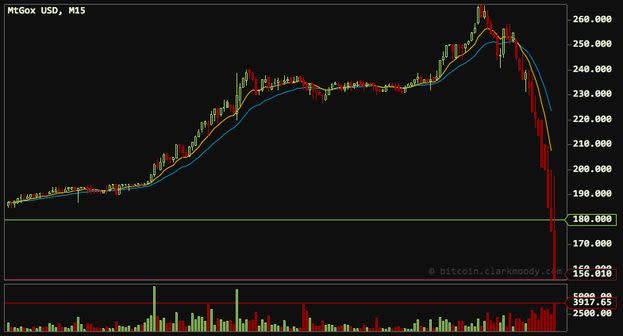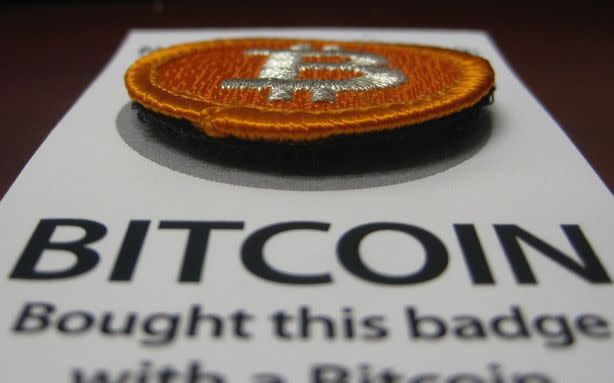Today's Bitcoin Crash Shows Why It's Not Really a Currency
After enjoying a week, or so of increasing value, Bitcoin took a huge dive today, explains why the "virtual currency" is not a currency at all, but more of a stock people have invested in to get rich. The coins started out at a high of $266 today, and have fallen to around $150, as this dramatic chart from Business Insider shows:
RELATED: Bitcoin Is Now a Billion Dollar Industry
RELATED: Iran's Currency Lost 40 Percent of Its Value Last Week
Currencies are allowed to lose value over time. That happens. But Bitcoin is designed specifically such that it will have these kinds of rises and falls all the time. And for that reason, the majority of people are using it more like an investment than a way to buy things.
RELATED: Bitcoin's Speedy Fall: EFF Halts Donations and Wikileaks Cashes Out
The system encourages hoarding, which is not a great thing for an economy. This is happening for a couple of reasons. First, there will one day be a finite number of coins. The system will cap out around 21 million, currently there are something like 11 million in circulation. When there is only a certain number of a valuable commodity, people don't want to spend it. This hoarding causes instability, as Pascal-Emmanuel Gobry explained over at Forbes. He compares it to a babysitting co-op Paul Krugman once wrote a column about in The New York Times:
A problem arose when people tried to hoard coupons to build a reserve and then run it down. The more people tried to hoard coupons, the less people were willing to go out and get their babies sat. And since there were less coupons in circulation, there were less babies sat. The baby co-op, in other words, had entered a recession.
It's kind of how, back in 2009, people in Argentina held onto their pocket change out of fear for their credit system. As coins became scarce, Buenos Aires bus riders didn't want to spend their coins because they were saving it up for their own trips, which only exacerbated the shortage as coins were hoarded by people fearful of a coin shortage. That same thing will happen to bitcoins, especially since there are only so many out there and, if the price goes up, make them too valuable to exchange for mere goods and services. (This is also kind of like the great Argentina coin shortage because people were possibly keeping the coins believing that inflation had made the metal in them more valuable than their face value.) But it doesn't stay that way forever. People hoarding bitcoins because they think they are too valuable to spend will lead to crazy instability, as Matt Yglesias explains at Slate. "The problem is that if the price of a bitcoin is on a steady upward trajectory, then nobody's actually going to want to spend a bitcoin on anything. And if everyone's hoarding their bitcoins, then the network is actually useless. Then since it turns out to be useless, you get a crash," he writes.
RELATED: Iranians Clash with Police as Their Currency Plummets
All the hoarding and the inevitable ups and downs suggest people aren't using it to buy things, but instead selling and trading it like a stock. Stability is one of the reasons currency works, as Vanity Fair's Kurt Eichenwald explains: "The essence of a currency is a rational expectation of relatively stable valuation. Yes, values can collapse or soar, but those circumstances relate to unusual events and, for the most part, are widely predictable ahead of time. Outside of those circumstances, the values of valid currencies tend to fluctuate within a reasonable range." Bitcoins are more like a share of stock, Eichenwald suggests, "I could certainly purchase items with shares of Google Inc.—I would just have to find a seller willing to accept them—but no one would rationally say that makes stock into a currency rather than an investment."
RELATED: Bitcoin Cyber Geeks Outraged at Paul Krugman
To be fair, there are some people who aren't using it like a stock, such as Bitcoin aficionado Erik Voorhees, who believes that a tiny fraction of the hype over the last few weeks will result in real infrastructure developments for the money, he explained in an interview with BuzzFeed.
But not even he really knows if the value will hold over time, he explained in a Reddit post. "Either Bitcoin is worth zero, or is worth thousands of dollars each. It will take years for the market to figure out which it is," he wrote. And even within those years nothing sounds too certain: "As stated many times, Bitcoins are incredibly risky and volatile. The whole thing is one grand experiment. Don't ever hold more money in Bitcoin than you can afford to lose, and in general you should assume the whole thing will go to zero." Would you ever assume the cash in your wallet is worth nothing?



